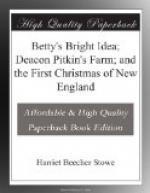Yet Mary Pitkin knew in her own calm, clear head that she had not been reckless of expense. The yearly interest money was ever before her, and her own incessant toils had wrought no small portion of what was needed to pay it. Her butter at the store commanded the very highest price, her straw braiding sold for a little more than that of any other hand, and she had calculated all the returns so exactly that she felt sure that the interest money for that year was safe. She had seen her husband pass through this nervous crisis many times before, and she had learned to be blamed in silence, for she was a woman out of whom all selfness had long since died, leaving only the tender pity of the nurse and the consoler. Her soul rested on her Saviour, the one ever-present, inseparable friend; and when it did no good to speak to her husband, she spoke to her God for him, and so was peaceful and peace-giving.
Even her husband himself felt her strengthening, rest-giving power, and for this reason he bore down on her with the burden of all his tremors and his cares; for while he disputed, he yet believed her, and rested upon her with an utter helpless trust, as the good angel of his house. Had she for a moment given way to apprehension, had her step been a thought less firm, her eye less peaceful, then indeed the world itself would have seemed to be sinking under his feet. Meanwhile she was to him that kind of relief which we derive from a person to whom we may say everything without a fear of its harming them. He felt quite sure that, say what he would, Mary would always be hopeful and courageous; and he felt some secret idea that his own gloomy forebodings were of service in restricting and sobering what seemed to him her too sanguine nature. He blindly reverenced, without ability fully to comprehend, her exalted religious fervor and the quietude of soul that it brought. But he did not know through how many silent conflicts, how many prayers, how many tears, how many hopes resigned and sorrows welcomed, she had come into that last refuge of sorrowful souls, that immovable peace when all life’s anguish ceases and the will of God becomes the final rest.
But, unhappily for this present crisis, there was, as there often is in family life, just enough of the father’s nature in the son to bring them into collision with each other. James had the same nervously anxious nature, the same intense feeling of responsibility, the same tendency towards morbid earnestness; and on that day there had come collision.
His father had poured forth upon him his fears and apprehensions in a manner which implied a censure on his son, as being willing to accept a life of scholarly ease while his father and mother were, as he expressed it, “working their lives away.”
“But I tell you, father, as God is my witness, I mean to pay all; you shall not suffer; interest and principal—all that my work would bring—I engage to pay back.”




